Intel or AMD Ryzen: Which CPU is best?
- 15 February, 2021 14:11

AMD has been unafraid to push back against the long-standing dominance of Intel in the CPU arena by talking up both the value-per-dollar and high-end performance delivered by their latest Ryzen hardware.
In 2020, AMD debuted the Ryzen 5000 desktop CPUs including the high-end Ryzen 9 processor. AMD's latest line of processors are primed to compete against Intel's current Core i3, i5, i7 and i9 offering.
Let's take stock and see how the two silicon heavyweights compare.
Which CPU is best: Intel or AMD Ryzen?
The Short Version?
In our opinion, many non-enthusiast PC builders will be better off buying a processor like the Intel Core i7-12700KF (Amazon) even if it costs a little bit more than its closest Ryzen counterpart (Amazon). However, if you're looking for more grunt or want to crank the settings menu in Cyberpunk 2077 all the way to ultra without breaking the bank, AMD's higher-end Ryzen processors are the way to go.
AMD Ryzen — in a nutshell
 Credit: IDG
Credit: IDG The first wave of AMD’s mainstream Ryzen chips was split across three families: Ryzen 7, Ryzen 5 and Ryzen 3. The higher the numeral, the higher the spec of the processor. Simple enough, right?
This initial three-tiered approach also made it pretty easy to compare AMD’s Ryzen chips against the competition. The Ryzen 3 was an entry-level alternative to the Intel i3, the Ryzen 5 was a mainstream counterpart to the Intel i5, and the Ryzen 7 was pitched in opposition to the performance offered by an Intel i7.
Then, in 2018, AMD introduced their second wave of Ryzen CPUs. Relying on a new 12nm manufacturing process and Zen+ architecture, this second series of Ryzen CPUs was broken out into four families. The Ryzen 3, Ryzen 5 and Ryzen 7 all returned. This reincarnated Ryzen family offered higher boosted clock speeds, reduced power consumption
AMD also topped out the range with a set of ultra-high-end CPUs called the Threadripper.
 Credit: Gordon Mah Ung/IDG
Credit: Gordon Mah Ung/IDG Where the mainline Ryzen range offers an impressive 8 cores and 16 threads, the Threadripper series starts at 12 cores and 24 threads and goes all the way up to 64 cores and 128 threads. It’s wild.
The extra processor cores offered by Ryzen compared to Intel’s Kaby and Coffee Lake CPUs meant that certain tasks ran MUCH faster. If you did a lot of 3D rendering/video encoding or any of your favourite games ran better on multiple cores (few do, but some popular titles like Battlefield 1 and Civ are included in the short-but-growing list) then the extra money was well worth paying. The extra cores could also help with video game streaming on services like Twitch.
In late 2019, AMD updated their Ryzen portfolio. However, they didn't just upgrade the Ryzen 3, 5 and 7. They also introduced a new option to the range: the Ryzen 9.
If you've been noticing more fanfare around AMD in the last six months or so, the Ryzen 9 series is probably the reason why. In his review, Gordon Mah Ung called the chipset 'historic' for AMD and said that "With the 16-core Ryzen 9 3950X, AMD is essentially running down the field, spiking the ball, and doing what the NFL would probably fine for excessive end-zone celebrations these days." Since then we've been introduced to the AMD Ryzen 9 5900X, which is much faster and offers even greater performance for gamers looking for an edge.
If you're looking for a short and easy way to navigate AMD's Ryzen family: here's the most important thing you need to understand. Right now, every current AMD Ryzen CPU you can build a desktop PC around falls into one of the following five families:
Ryzen Threadripper (Currently unavailable on Amazon)
Intel Core - In a nutshell
 Credit: Dreamstime: Chiradech Chotchuang
Credit: Dreamstime: Chiradech Chotchuang Generally speaking, Intel Core i7 CPUs perform better than Intel Core i5 CPUs, which are in turn better than Core i3 CPUs. A Core i7 does not have seven cores nor does Core i3 have three cores. The numbers are more of an arbitrary way to distinguish between their relative processing powers than a specific designation based on core count or clock speed or anything technical like that.
There's also the Intel Core i9 to consider. Introduced in 2017, the Core i9 series is a super high-end range of processors that boasts incredibly high thread and core-counts. The top-end Core i9-12900Ks (Amazon) touts 16 cores (8 Performance cores and 8 Efficiency cores clocked at 5.20 Ghz) and can handle 24 threads at once while the cheapest option on Amazon - the i9-10850K boasts 10 cores (capable of serving 20 threads) and a base clock speed of 3.6GHz.
[Related: Which Intel Core CPU is the best? How do I decide between a Core i3, i5, i7 or i9?]
Unfortunately, as fearsome (and appealing) as those numbers might sound, most modern software isn’t really ready to make use of these capabilities - especially in the gaming space. They're also quite expensive compared to the rest of the lineup. In many respects, they're more analogous to AMD's Ryzen Threadripper CPUs than they are Ryzen 9 CPUs.
 Credit: Adam Patrick Murray/IDG
Credit: Adam Patrick Murray/IDG As put by PCWorld's Gordan Mah Ung, "If you’re buying a 16-core CPU solely to play games, you might want to consider an 8-core chip, or even a 6-core chip instead, because few games can use all of the cores. That’s the conventional wisdom, anyway. The problem is modern gaming isn’t about playing a game, winning, and going to sleep warm and happy. It’s about streaming it live, or recording it while adding LOL memes, sound effects, and all kinds of “gaming”-related tasks that didn't exist a few years ago."
So while i7s and i9s do offer higher performance than i3s or i5s, whether or not they’ll be better for you really does ultimately depend on what you’re using your PC for and how much you can afford to spend.
If you're looking to build your next desktop PC around Intel's latest (12th Generation) Core processors, here's what to expect:
- Intel Core i3 (Starts at $169 on Amazon)
- Intel Core i5 (Starts at $269 on Amazon)
- Intel Core i7 (Starts at $519 on Amazon)
- Intel Core i9 (Starts at $779 on Amazon)
Next Page: How does AMD's Ryzen CPU compare to Intel's Core CPU for performance?
Page Break
AMD Ryzen and Intel Core CPU Specs Compared
Here's a quick table allowing you to quickly and easily see how each AMD Ryzen CPU compares to their Intel counterparts when it comes to hardware specs.
Intel Core i3 (12th Gen) vs Ryzen 3
Desktop
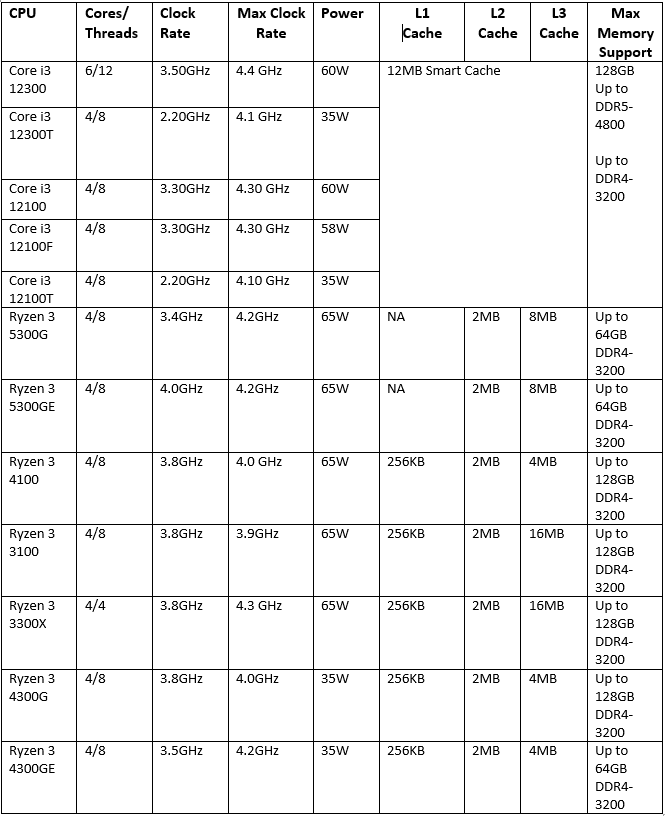 Credit: IDG
Credit: IDG Mobile
 Credit: IDG
Credit: IDG
When it comes to desktop CPUs, Intel has something of an edge against AMD's CPUs with the top-line Intel i3-12300 capable of higher maximum clock speeds than anything else on the table here. However, it's worth noting that AMD's Ryzen 3 CPUs have higher base clock rates overall.
We see the same trend on the mobile front - Intel's Core i3 CPUs emerge as winners if you're looking at maximum clock rates. However, AMD's mobile CPUs once again have higher base clock rates.
Intel Core i5 (12th Gen) vs Ryzen 5
Desktop
 Credit: IDG
Credit: IDG Mobile
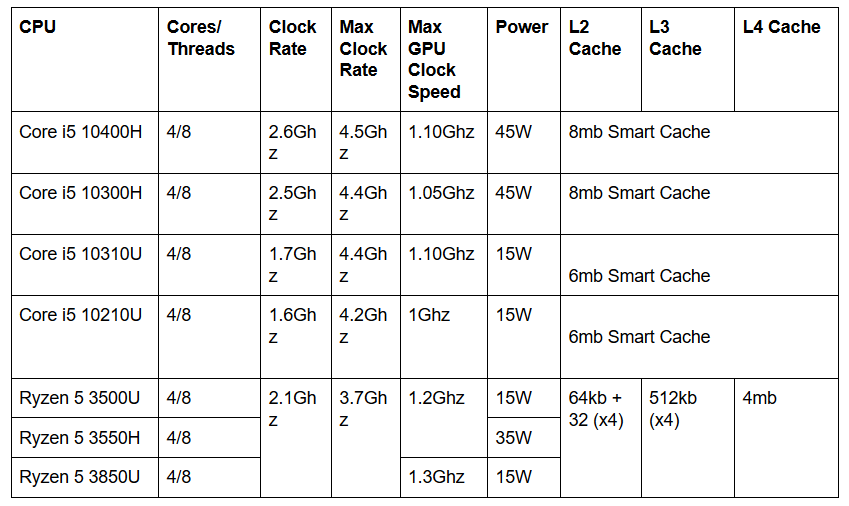 Credit: IDG
Credit: IDG
The Ryzen 5 Desktop CPUs aren’t quite as power efficient as their mobile counterparts and they lack the integrated graphics found in Intel’s Core i5 chips. However, they do offer higher thread counts, larger cache sizes and - in some cases - faster clock speeds.
One area where they can fall short, however, is in memory expansion. Ryzen 5 CPUs support faster memory modules but they sometimes only support up to 64GB where Intel’s i5 chips are able to go up to 128GB.
On the mobile front, again, Ryzen excelled when it came to power efficiency and graphics rendering. However, it clearly lagged behind Intel when it came to both base and boosted clock speeds and cache size.
Intel Core i7 (10th Gen) vs Ryzen 7
Desktop
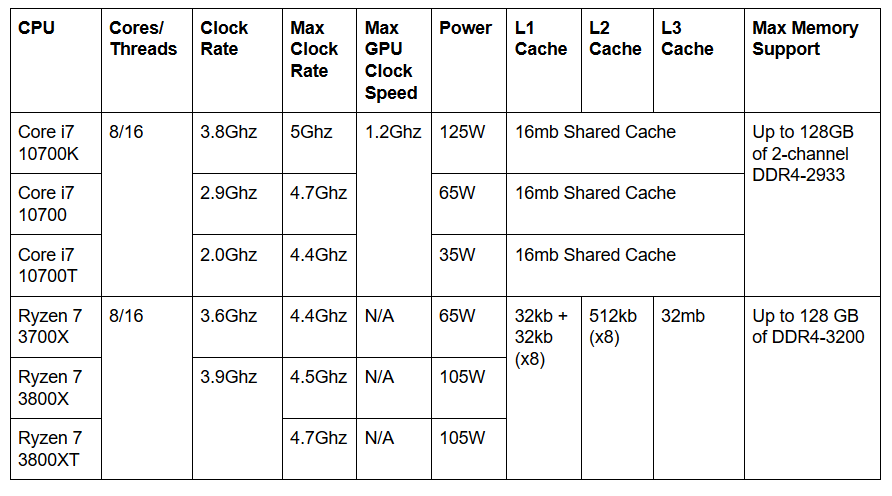 Credit: IDG
Credit: IDG Mobile
 Credit: IDG
Credit: IDG
Though a few caveats apply, we found that the scales really begin to tip in favor of AMD here. Though they might not reach the same highs as Intel’s i7 10700 and i7 10700K, the Ryzen 7 3700X, 3800X and 3800XT all boast significantly higher base performance.
As opposed to previous generations of Ryzen chipsets, the third generation hardware here also surpasses previous limits to match Intel for 128GB of supported memory. Factor in the cache advantages inherent to AMD’s architecture and the case for choosing a Ryzen 7 CPU over an Intel Core i7 isn’t hard to hear.
Things were a little closer when it came to Ryzen Mobile. The latest in Ryzen 7 mobile processors can’t match the thread and core count allowed for by Intel’s own Core i7 processors, nor can they keep up when it comes to clock speeds.
That being said, the Vega graphics processing grunt that comes integrated with Ryzen 7 easily eclipses what you’re going to get out of Intel’s own in-house GPU. If the laptop you’re looking at also features a dedicated graphics card, that’s not necessarily going to be a big deal but, if it doesn’t and you’re keen to squeeze in some gaming, then it’s going to probably be worth siding with AMD here.
Intel Core i9 (10th Gen) vs Ryzen Threadripper
Desktop
 Credit: IDG
Credit: IDG
If you’re the kind of high performance power user that AMD and Intel are looking to woo with the Threadripper and Core i9 respectively, your preference is ultimately going to come down to whether you think the higher clock speeds available with Intel are worth the higher the thread count, cache size and memory support you’ll get AMD.
Of course, it should also be noted that even the cheapest ThreadRipper consumes twice as much power as its i9 counterpart and that while the latter does include integrated graphics, they aren't any better than what you'll get out of the closest Intel Core i7 processor.
Page Break
Which CPU price is best: Intel or AMD?
As always, it should be noted that component pricing can sometimes be quite elastic. The below comparisons have been put together using PCPartsPicker.com.
Intel Core i3 (10th Gen) vs Ryzen 3
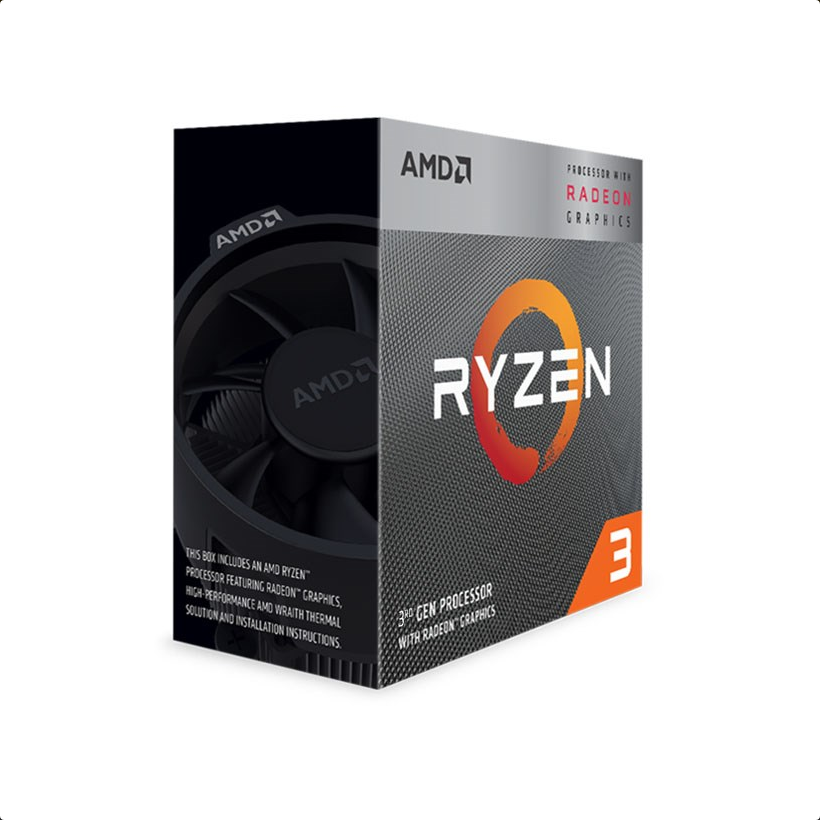 Credit: AMD
Credit: AMD Depending on where you’re buying them from, Intel’s current crop of i3 CPUs currently range from approximately $206 on the low-end to $406 for the i3-10300. In comparison, AMD’s Ryzen 3 3200G can be had for about around half that at $175 (we’ve seen it as low as AU$138). And when you compare the two, it’s easy to see the value.
Even if it does fall short on clock speed and cache size, Ryzen offers significantly better on-board graphics plus reduced power consumption.You can find it on Amazon here.
Intel Core i5 (10th Gen) vs Ryzen 5
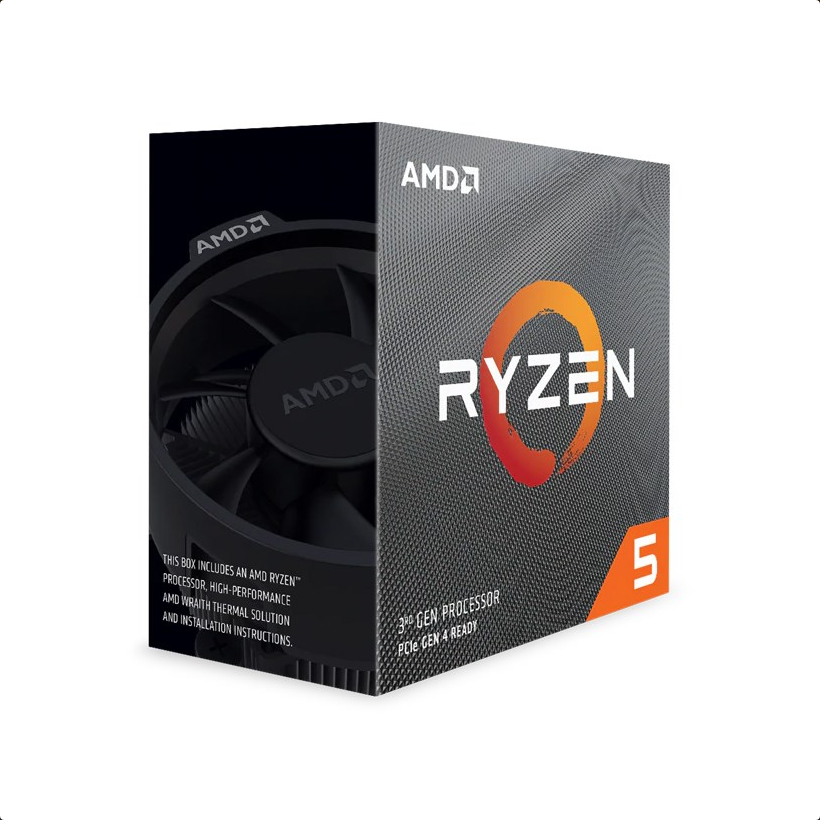 Credit: AMD
Credit: AMD Depending on where you’re buying them from, Intel’s current crop of i5 CPUs currently range from around $356 for the i5-10500 to $455 for the i5-10600. In contrast, you can grab a Ryzen 5 2600X for $339 or Ryzen 5 3400G for $240 respectively.
Again, the Ryzen counterparts to Intel’s i5 chips are almost half the price - so, even if they do fall short on certain fronts, there’s a lot of value here. You can find it on Amazon here.
Intel Core i7 (10th Gen) vs Ryzen 7
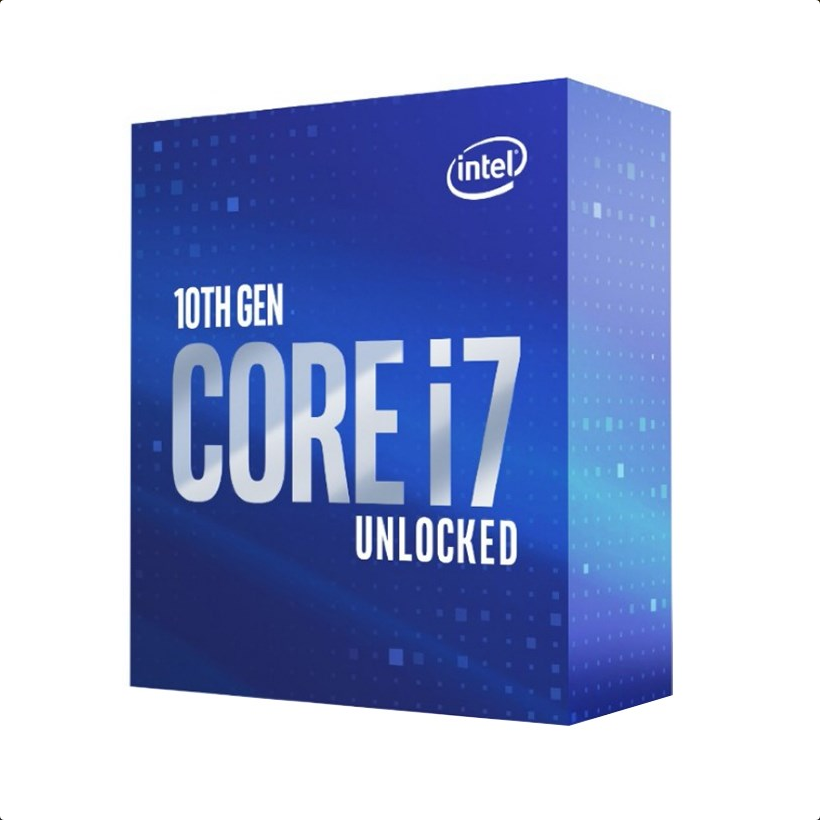 Credit: Intel
Credit: Intel Depending on where you’re buying them from, AMD’s Ryzen 7 CPUs float between $350 and $520. As usual, Intel’s CPUs tend to be slightly more expensive. We’ve seen the i7-10700 go as low as $586. We’ve seen the i7-10900 go as high as $895.
As noted in our theoretical comparison, the latest in Ryzen 7 mobile processors simply can’t match the thread and core count allowed for by Intel’s own Core i7 processors, nor can they keep up when it comes to clock speeds. Depending on what you're looking do with your PC, that might just be enough reasons to pay the premium here.
Intel Core i9 (10th Gen) vs Ryzen Threadripper
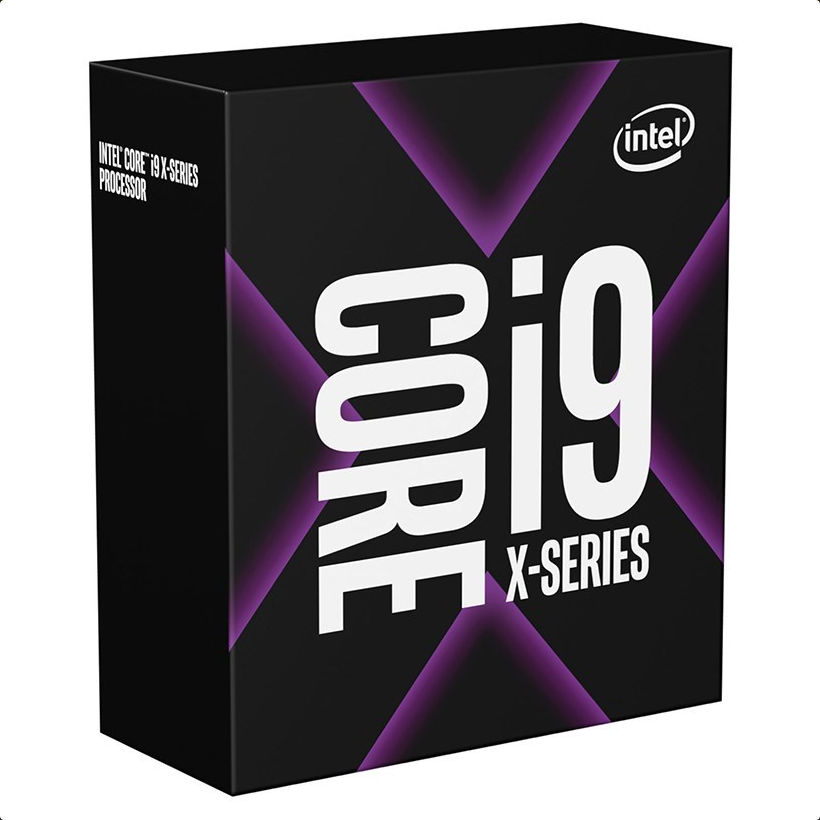 Credit: Intel
Credit: Intel This is the one front where AMD doesn’t have the edge on price. Depending on where you buy from, you’ll probably be able to pull one of Intel’s high-end i9 CPUS for as low as $895 and as high as $949.
In contrast, AMD's mighty Threadripper CPUs start at around $2399 and we’ve seen them go as high as $6262. They offer a level of performance that Intel’s i9 hardware can’t match, to be sure. However, no matter how you swing it, that’s higher pricing is a pretty bitter pill to swallow. You can find it on Amazon here.
Next Page: How do AMD Ryzen and Intel compare in practice?
Page Break
AMD Ryzen and Intel Compared
Performance: How we test
For the Intel tests we used our regular Test Rig components and an Intel Core i7 7700K CPU.
The AMD AM4 Test Rig used the same Samsung 960 Pro NvME hard drive, Nvidia 1070 graphics card but opted for a Gigabyte Aorus GA-AX370-Gaming 5 motherboard (BIOS rev: 5b) and Corsair Vengeance 3000MHz LPX DDR4 RAM.
[Related: Everything you need to know about NVMe]
We ran the tests at default BIOS settings with only the memory timings being adjusted to run at the advertised speeds.
AMD told us that these still need to be done manually but we found on our Gigabyte motherboard that we could still set the timings and voltage automatically using Intel’s proprietary XMP settings. It only took a couple of clicks and we were good to go.
Related: How to set up new RAM using XMP
Overclocking
We then ran the same tests with a system’s automatic overclocking features. We don’t tweak settings as high as an enthusiastic overclocker might, since (relatively) few people will be bothered to do the same. However, where it made sense (like if our motherboard settings or an app made it easy to stably boost performance), we were happy to do so.
 Credit: ID 145429696 © Oleksandr Lutsenko | Dreamstime.com
Credit: ID 145429696 © Oleksandr Lutsenko | Dreamstime.com For example, Intel’s processors played nicely with the Gigabyte Z170X Designare motherboard’s built-in (and automatic) overclocking settings to allow us to easily increase the clock speed on our CPU. This feature isn’t available on Gigabyte's AX370 mobo but same sort of overclocking can be achieved by launching the RyzenMaster Windows app and sliding the sliders to select the speed you want.
We only had access to a modest Noctua NH-U12S SE-AM4 air cooler which meant we couldn’t push the Ryzen 1800X CPU too hard. Ryzen’s built in heat management means it manages its own speed at high temperatures. This has the side effect of running faster when cooler. We found the 3.6GHz CPU crashed at 4.1GHz but would run stably at 4GHz.
The exception here was in the Cinebench 3D rendering test which pushes all cores to 100% usage. It quickly crashed at 4GHz and only worked sporadically at 3.8GHz. We strongly suspect that a better cooler will improve this performance but, unfortunately, we didn’t have access to one at the time of writing.
Why AMD Ryzen requires Windows Power Settings to be set to High Performance?
We usually leave our test rig at default settings with Balanced Performance but AMD insists that it requires Windows to be set to High Performance in order to get the best from Ryzen because of the platform’s innovative heat-influenced performance features which can be detrimentally affected by Windows core parking and power management.
We found that switching from Balanced to High Performance yielded immediate results. Doing so raised Ryzen’s PC Mark score from 4171 to 4317 (this compares a Core i7 7700K's Balanced Performance score of 4411).
Which processor was faster: Intel or AMD?
Generally speaking, Intel’s 7th Generation Kaby and Coffee Lake processors are faster than AMD’s Ryzen processors but there are exceptions. In general usage Intel wins but if and when an application or game that takes full advantage of all the available cores is used, Ryzen can be significantly faster.
Our AMD Ryzen test rig arrived with some unusual tweaks (AMD is adamant it shouldn’t have but it did) and when we reset the (rev. 3f) BIOS (and set up the RAM with XMP timings) it scored 3,944 in PC Mark.
Gigabyte provided us with the latest rev. 5b version and the score increased to 4,010. That’s still behind the Kaby Lake 7700K’s 4,448 and also behind Intel’s older 6th generation 4GHz Skylake Core i7 6600K score of 4,040.
When overclocked the Ryzen score only increased to 4,147 but the Intel 6700K pushed on to 4,355 and the 7700K pushed on to 4,477.
 Credit: IDG
Credit: IDG So in the general usage PC Mark test, Intel wins – which will be enough for most people.
We also ran the Creative 3.0 PC Mark test which focuses more on photo manipulation and video editing. In this case Intel scored 5,853 while Ryzen scored 5,861. That’s a slight win for Ryzen which, as we see below, will translate to potentially-dramatic time saving if you do extensive media encoding.
3D Mark Ryzen results
 Credit: FutureMark
Credit: FutureMark In 3D Mark the 1800X Ryzen processor scored consistently higher than Intel’s 7700K. However, this score is made up of three parts: two graphics tests and a CPU test.
Both graphics tests were actually very similar: 37fps and 32.5fps which isn’t surprising due to both systems relying on the same Nvidia GTX 1070 graphics card. Still, 3D Mark appears to make good use of the extra cores on offer with Ryzen and it scored 26fps versus Intel's 18.5fps.
 Credit: IDG
Credit: IDG While these are all airy fairy numbers it does tell us that when used as a general gaming system both platforms are comparable in performance. It also reflects the fact - regardless of what really goes into creating these scores - that if a game (or game benchmark) is optimised to use more than four cores, it will perform better with AMD Ryzen.
For that reason, it’s worth checking how your favourite game supports more-than-four cores. As far as we understand, the following games do: Battlefield 1, Battlefield V, Civilization 6, Ghost Recon: Wildlands, Rise of the Tomb Raider, DOOM, Lords of the Fallen, Wolfenstein: The New Colossus and Forza Horizon 3.
Cinebench R15
 Credit: MAXON
Credit: MAXON Cinebench renders a 3D scene and is useful in that it maximises all cores and threads when it runs. It’s in tasks like this (and movie encoding) where you’d expect an eight-core processor like Ryzen should destroy a four-core processor like the Kaby Lake 7700K - and it did.
At stock speed it scored 1,604 compared to the 7700K’s 995. When overclocked to 3.8GHz the Ryzen managed 1637. This is almost double what Intel’s 7700K was able to offer.
This test which really shows how AMD’s platform excels. Usually, you’d use an Intel Core i7 6900K (which scored 1,560) to perform extensive rendering and encoding tasks but those cost $1500.
That AMD Ryzen can beat that performance when it costs less than half the price is truly outstanding.
Next Page: Which CPU should you buy right now?
Page Break
Which CPU should you buy right now?
AMD deserves a great deal of credit for coming back from nowhere to match Intel and produce some interesting technology but its claims of matching Intel for dramatically less money are somewhat misguided. If we’re talking general day-to-day usage, Intel’s platform is often still faster and cheaper.
 Credit: Intel
Credit: Intel Most buyers will be better off buying a processor like the Intel Core i7-10700 (Amazon) even if it costs a little bit more than its closest Ryzen counterpart (Amazon) and, as far as most general-usage tasks go, it performs better. It also doesn’t require having your PC set up for Maximum Performance - which is not healthy for power bills.
However, the math here changes dramatically if you regularly need your PC to perform any of the following tasks:
3D Rendering or video encoding
Playing a game where performance is boosted by multiple cores
Enthusiast-grade overclocking
Streaming your games online without using a separate computer
In these instances, Ryzen will be worth paying the premium for as it won’t just enhance your enjoyment but save you a lot of time - and potentially money as well. You can find the full Ryzen range on Amazon here.
[Related: Gigabyte Aorus GA-AX370-Gaming 5 AMD Ryzen motherboard review]
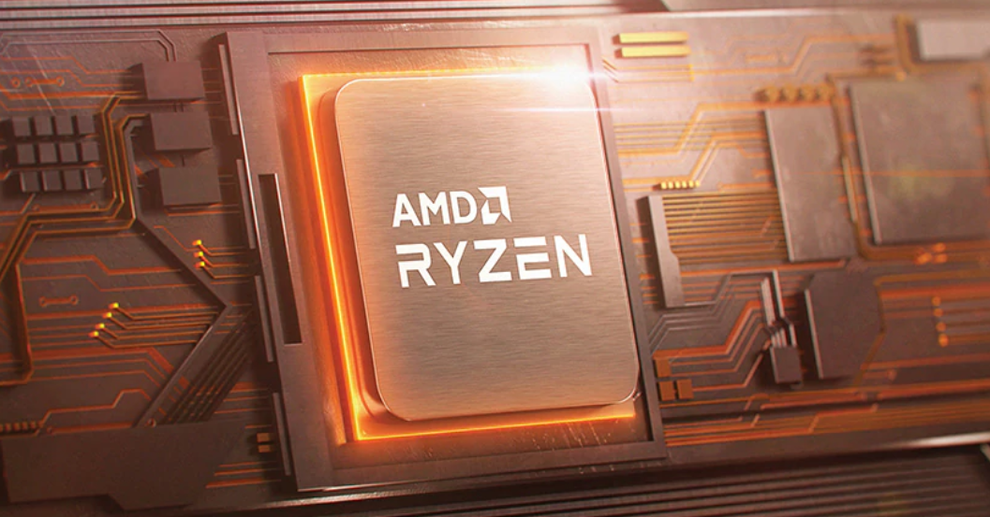 Credit: AMD
Credit: AMD [Related: RyzenMaster and HPET can make your Ryzen computer run slower]
This article was originally published on 3rd March 2017 by Nick Ross. It was updated on the 15th February 2021 by Fergus Halliday.





